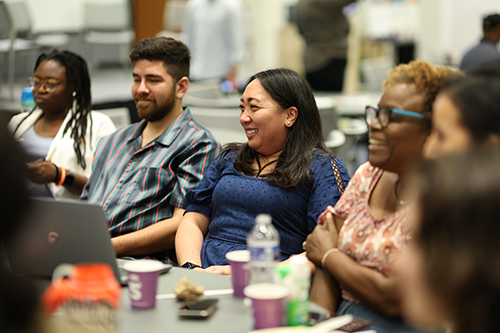
By working to eliminate the underlying conditions of conflict, can cooperatives help achieve peace? That’s the case guest author Martin Lowery makes in this week’s Principle 6 newsletter.
Read the full newsletter below, then consider how cooperatives could work together to create the conditions for a more peaceful society. NCBA CLUSA is on a mission to document Principle 6 collaborations across the country so we can identify trends, document best practices and share this knowledge with you—our fellow cooperators!
Share your example of Principle 6
Principle 6 Newsletter – Co-ops and the Quest for Positive Peace
March 22, 2023
The cooperative movement, beyond creeds and political traditions, has sustained since its origins its commitment to positive peace, as the goal and means to build a society founded on the values of democracy, equality, solidarity, participation and concern for the community. – Declaration on Positive Peace Through Cooperatives, ICA General Assembly, Kigali, Rwanda, October 17, 2019
It is in the building of a people-to-people peace process, parallel to the political peace process, that the direct and significant involvement of cooperatives—and if I may add, the task which falls upon cooperatives—is immediately perceivable. – Yehudah Paz, “Cooperatives and the Pursuit of Peace”
Peace, social justice, freedom, and solidarity are the pillars of cooperation, and represent the basis for active and responsible participation aimed at opening up new ways to contribute to true human development. Cooperation is the natural companion of peace, while war—wrote Bertrand Russell—is an extreme form of competition. – Ivano Barberini, ‘Building New Paths to Peace’

The concept of “positive peace” was first introduced by Norwegian sociologist Johan Galtung in the 1950s and has gained a growing interest from researchers and cooperators ever since. Galtung defined “negative peace” as the absence of war and violence and “positive peace” as a more permanent peace that is built on sustainable economic development and collaborative and supportive relationships.
The global cooperative movement, under the auspices of the International Cooperative Alliance, has addressed from its very beginnings the relationship between peace and cooperatives. The ICA Congress of 1901 held in Manchester, UK, was dedicated to social and international peace.
Twelve years later, at the 1913 ICA Congress in Glasgow held on the eve of World War I, the ICA delegates unanimously declared that “when each country’s social and economic life becomes organized according to cooperative principles, international conflicts may cease.” Perhaps more realistically, the resolution called on cooperatives to campaign for peace because “…the maintenance of peace and goodwill among all nations constitutes an essential condition for the development of cooperatives.”
At the start of World War II, the ICA membership approved a declaration titled “Peace, Freedom and Cooperation are Indivisible.” As the war raged on, a further ICA declaration in 1942 announced the interest of the international cooperative movement in post-war social and economic reconstruction.
More recently, in 2006, the ICA membership declared that “cooperatives are based in a group of values and principles conceived to promote the cause of Peace.”
Finally, in 2019, as referenced above—in the context of the horrendous genocide in Rwanda—the ICA General Assembly in Kigali, Rwanda approved the “Declaration on Positive Peace Through Cooperatives.”
The question quite naturally arises as to whether these historic policies and pronouncements have relevance and applicability in today’s global environment in which conflict, genocide and war persist.
To answer this question, we need to dig a little deeper into Johan Galtung’s idea. A negative peace—an example of which might be the use of a United Nations’ Peacekeeping Force to maintain a cease fire or the drawing of an artificial national boundary to achieve a negotiated settlement to a war—will only serve as a stopgap measure and not as a structural solution to the conditions that lead to conflict and war in the first place.
Positive peace seeks structural change that has the potential to eliminate the underlying conditions of conflict such as economic disparities, supply chain disruptions for fundamental goods and services, racial and gender discrimination and social injustice of all types.
Positive peace seeks structural change that has the potential to eliminate the underlying conditions of conflict such as economic disparities, supply chain disruptions for fundamental goods and services, racial and gender discrimination and social injustice of all types.
Joy Emmanuel and Ian MacPherson, in their introduction to the anthology Cooperatives and the Pursuit of Peace relate the cooperative principles and values directly to the potential influence that cooperatives can have on positive peace.
First, they suggest that the cooperative values—self-help, self-responsibility, democracy, equality, equity and solidarity—as well as the ethical values adopted by cooperatives—honesty, openness, social responsibility and caring for others—“if given life and applied appropriately within effectively managed organizations, should prove useful in strife-torn communities; they are the vital advantage and distinctive trait cooperatives bring to difficult situations.” In other words, the visibility of the cooperative values through the work of local cooperatives can act to reduce the sources of conflict within a community or region.
Second, they suggest that living and appropriately applying the cooperative values through effective cooperative management can be done by deliberatively acting on the cooperative principles:
Voluntary and Open Membership – Membership is open to all persons, without gender, social, racial, political, or religious discrimination, a particularly important quality in divided communities.
Democratic Member Control – Cooperatives are democratic organizations. They are accountable to their members, an especially useful model in communities where there are low levels of trust or high levels of political control.
Members’ Economic Participation – Cooperatives meet local needs first, an important principle amid the turmoil of communities under stress and where it is vital for the well-being of the cooperative and/or the community that people retain control over local resources.
Autonomy and Independence – Cooperatives are autonomous, self-help organizations that ensure, teach and support democratic control by the members.
Education, Training and Information – This is an important aspect of community building and can include training in dispute resolution and the development of programs to encourage peaceful relations among members and on [governing] boards.
Cooperation Among Cooperatives – In communities experiencing turmoil, cooperatives can mobilize resources through local, national and international cooperative networks, a particularly important resource in times of stress.
Concern for Community – Cooperatives are about more than meeting the economic needs of their members. Cooperatives also foster a concern for the social issues that impact the broader community, including those issues that divide and weaken communities, the forces that produce tensions, and social concerns that can lead to violence.
“Because of their values and principles,” Emmanuel and MacPherson conclude, “cooperatives are well suited for the vital, and sometimes daunting, task of being agents of peace.”
Daunting as it is, might we imagine the day when the structural barriers to peace have been eliminated across the globe? Might we imagine a vital role for cooperatives from all sectors and regions in making that happen? It would be a glorious day indeed.
Stay tuned,
Martin


